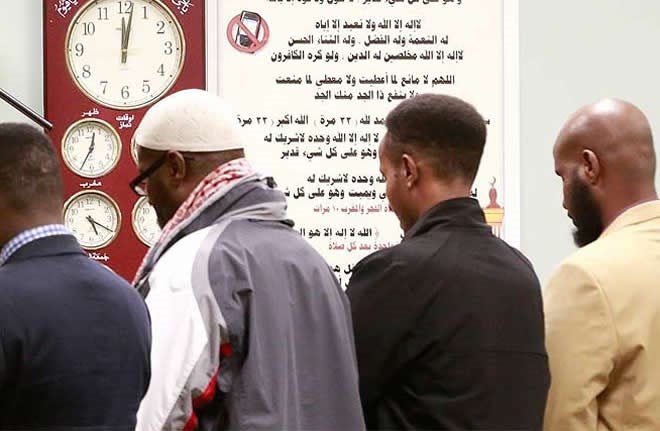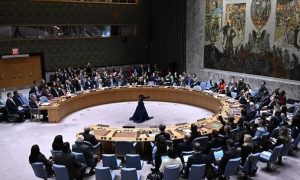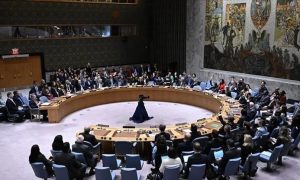
Somalis have been in Columbus for two decades, and while many live near one another on the Northeast Side and western Franklin County, they are moving into other areas of central Ohio and becoming part of the larger community. BARBARA J. PERENIC | DISPATCH FILE PHOTO
Columbus, Ohio | December 4, 2016 – When events place an unwelcome spotlight on the Somali community, as did last Monday’s attack at Ohio State University, some younger Somalis say they feel it in ways different from their parents.
Abdul Razak Ali Artan, a third-year student in his first semester at Ohio State, injured at least 12 people on campus before he was killed by a university police officer. Artan, 18, was born in Somalia and came to the United States with his family two years ago from Pakistan.
Though most college-age Somalis in Columbus have grown up in this country, when a Somali is implicated in something bad, “It affects us even more,” said Mohamed Abdullahi, 18, a Somali and president of the Muslim Student Association at Columbus State Community College.
“We’re looked at as people who should be more assimilated than our parents.”
This can leave Somali refugees who grew up here taking flak from two sides, Abdullahi said. “We’re stuck between the sword of extremism, where some Muslims say, ‘You’re watering down your faith, you’re not a proper Muslim,’ and some non-Muslims who say that even praying five times a day is too much.”
Abdullahi fears that an aberrant act by a young Somali “becomes a major disappointment” to non-Somalis. “They might feel that, no matter what generation we are, we are not truly part of the community.”
Yet Somalis have been in Columbus for two decades. Many live near one another in apartments and communities on the Northeast Side and western Franklin County, but, like other immigrant and refugee communities before them, they are moving into other areas of central Ohio and becoming part of the larger community. They’re attending Columbus and suburban schools, and area colleges and universities, working for area employers and starting their own businesses.
Federal authorities said Artan was inspired by American-born cleric Anwar al-Awlaki, an al-Qaida leader killed by a U.S. drone strike in 2011.
But though some fear other young Somalis could be radicalized, Abdulqadir Ali of the Northeast Side said, “We’re not even talking about that stuff.”
“I’m just shocked that people do stupid stuff,” said Ali, 26, while he, his father and other family members watched an old “In the Heat of the Night” episode on TV in their apartment.
Columbus State student Mohamed Haji, 21, believes that, for Somalis to be respected and well-regarded by the larger community, young people must be involved. “Most of our parents came here as immigrants,” Haji said. “They gave us a better place to live, and that puts a lot of responsibility on our shoulders, to be more active in the community and contribute to the community.”
Isolation and fear
Even before Monday’s attack at Ohio State, some Somali-Americans felt isolation and fear, said Mariam Sayed, a 22-year-old accountant who lives on the Northeast Side.
“There was suspicion and hatred of people who look like me before this sad and tragic event, thanks to the Islamophobia and anti-immigrant sentiment whipped up by Donald Trump,” she said.
But unlike her parents’ and grandparents’ generations, Sayed believes that today’s Somali youth — many of whom were born in the United States or made the journey from refugee camps as young children — will come together to ease people’s fears.
“You shouldn’t condemn a whole people because of the actions of one person,” Sayed said. “We need to preach love not hate. We want to build — not burn — bridges. We have to establish trust, understanding and compassion.”
Trump weighed in on the OSU incident in a Tweet that called Artan, who was in the United States legally, a “Somali refugee who should not have been in our country.”
Such rhetoric, and the attack itself, also could lead to more hate crimes against Somalis and other American Muslims, Sayed said.
More than 100 anti-Muslim incidents have occurred across the country since the Nov. 8 presidential election, according to the Council on American-Islamic Relations. And 1,000 incidents targeting different minority groups have been documented by the Southern Poverty Law Center.
Omar Hassan, a 19-year-old forklift driver who lives on the West Side, said he occasionally is the target of suspicious looks and snide comments.
“The stereotypes that immigrants are dangerous to society and a drag on resources are plain wrong,” he said. “Like most other people, family, faith and country are the values that I hold dear.”
Thankfully, he said, the slights are few and far between. Hassan said he feels as American as if he were born here.
Born in Somalia, he came to the United States from a refugee camp in Kenya when he was 7. Originally settled in Minneapolis, he and his family moved to Columbus when he was 12 to be closer to relatives, he said.
Hassan said he’s always felt welcome in Columbus and feels people his age don’t see differences in nationality, religion and race as older adults might.
But he fears that could change following the attack and what he called Trump’s hateful speech against all minorities. “‘It’s hard not to feel at least a little on edge,” he said.
And he hopes that the messages of hatred toward immigrants and refugees don’t push anyone already feeling disenfranchised into the arms of jihadist recruiters.
Typical high-school kids
On the Northeast Side, Abdulqadir Ali’s sisters, Sabah Ali and Sumeyah Ali, shivered in the cold one recent afternoon as they waited for a friend getting off a bus at the Abbey Lane apartments, long a home for people of Somali descent near Morse Road and Cleveland Avenue. The girls are students at Westerville North High School: Sabah, 17, is a junior; Sumeyah, 14, a freshman.
Both cover their heads with the traditional hijab. And they both sound like typical high-school kids. Sabah Ali said she’s looking at colleges, including Capital University and Youngstown State University.
She said she was not treated differently at school after the Ohio State attack.
“I’m glad that everybody’s treated me the way they did before the incident,” she said.
Said Abdikarim, a 30-year-old graduate student at Harvard University, had similar experiences here. He lived on Columbus’ Far East Side for more than seven years while attending Ohio State University. And while at Ohio State, he said he “prayed everywhere.” He never felt threatened.
“I never felt a need to hide my religion,” he said.
Other immigrants feel differently. A group of nearly 20 immigrant and refugee leaders in Columbus has pledged to “work within our communities to address feelings of isolation, hopelessness and depression.”
The leaders of the New American Community Impact Collaborative met the day after the Ohio State attack to discuss it, as well as post-election challenges facing newcomers to the country and how to move forward.
The leaders of the group said they condemn acts of violence and expressed deep concern for Monday’s victims.
They also said they would work to connect immigrants and refugees to resources and mental-health professionals whenever they suspect a person is “overwhelmed with the trauma they have experienced” in their lives.
“Artan’s story was a human story of trauma and isolation,” said Ibrahima Sow, who came to the United States from Senegal in 1998 and unsuccessfully ran for a Columbus City Council seat last year.
Among Artan’s victims are his siblings and single mother who fled a civil war to heal, Sow told the group.
It is important for people to look beyond a person’s nationality or ethnicity and see them as people just like them, he said. “When we humanize our neighbors, we change the narrative and overcome our common challenges.”
.
.
.
____________________________
_____________________________________________________________________________________Xafiiska Wararka Qaranimo Online | Mogadishu, Somalia
_____________________________________________________________________________________Advertisement
_____________________________________________________________________________________







